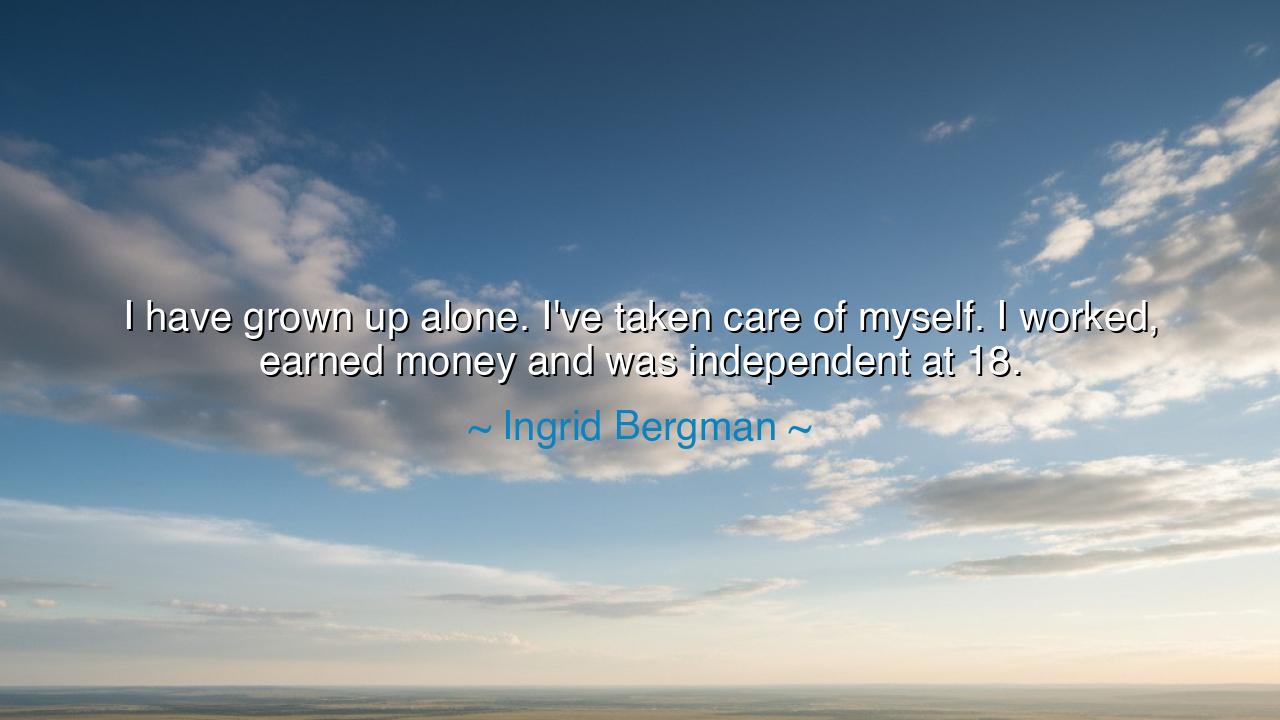
I have grown up alone. I've taken care of myself. I worked
I have grown up alone. I've taken care of myself. I worked, earned money and was independent at 18.






When Ingrid Bergman declared, “I have grown up alone. I’ve taken care of myself. I worked, earned money and was independent at 18,” she was not boasting of hardship, but testifying to the power of self-reliance — the sacred fire that burns within those who must stand without shelter and yet refuse to bow. Her words echo across time like a hymn to the strength of the solitary soul, one who finds in isolation not despair but discipline, not emptiness but awakening. In her voice we hear the song of all who have been forged by necessity into something stronger than circumstance. To grow up alone is to meet life barehanded, and in that struggle, to discover one’s own invincible spirit.
Bergman, born in Sweden in 1915, lost both her parents before she reached adulthood. The world gave her no gentle beginning, yet she rose to become one of the most luminous figures in the history of cinema — the star of Casablanca, Notorious, and Gaslight. Her journey was not merely one of fame, but of fierce independence. In a time when women were expected to follow, she led; when they were told to be quiet, she spoke through her art. Her declaration of having “grown up alone” was not a lament but a truth carved from experience — a reminder that solitude, though cruel, can also be the womb of strength. By necessity, she learned to stand where others might have fallen. By struggle, she learned to endure.
Her words, though born of the modern age, carry the wisdom of the ancients. For it has always been known that solitude is the crucible of greatness. Marcus Aurelius, the philosopher-emperor, wrote his Meditations not in comfort, but amid the loneliness of command, surrounded by war and mortality. Like Bergman, he found that to depend upon oneself is to awaken the god within. “Look within,” he said, “for the spring of goodness will never fail you if you keep digging.” So too did Bergman dig within herself — not for wealth or glory, but for survival, and in that act of endurance, she uncovered her greatness. The ancients would have called her a warrior of the spirit, one who transforms suffering into sovereignty.
But her words are not merely about survival — they are about independence, that rare and sacred condition of being whole in oneself. To be independent at eighteen, as she was, is to break the chains of dependency before the world even recognizes you as an adult. It is to bear the weight of your own life and to say, “I will not wait to be saved.” In this sense, Bergman’s quote is a song of awakening — a call to those who seek purpose in a world that often asks them to conform. She reminds us that freedom is not given; it is earned through the courage to stand alone.
Yet there is tenderness in her truth as well, for to “grow up alone” is also to know the ache of self-sufficiency — the longing for the comfort one never had, the hunger for love that discipline cannot satisfy. Herein lies the paradox of her strength: that independence often blooms from loneliness, and that loneliness, embraced with grace, can become wisdom. Bergman’s life teaches that solitude need not harden the heart; it can refine it. She carried herself through the world with poise, yet behind her strength was compassion — the understanding that those who have walked alone can often see most clearly the suffering of others.
We see this same truth in the life of Abraham Lincoln, who rose from the poverty of a log cabin to lead a fractured nation. Like Bergman, he “grew up alone” in spirit, teaching himself by candlelight, learning to think, to reason, to lead. His independence was not arrogance but necessity; it was born from hardship and tempered by humility. Both Lincoln and Bergman show that solitude, when embraced rather than feared, becomes the training ground for destiny. Those who rely only on themselves learn resilience — and those who temper that resilience with compassion become beacons to others.
So, my children, take this lesson to heart: do not fear standing alone, for it is in solitude that the soul discovers its true measure. The world may abandon you, circumstances may strip away your comforts, but within you lives a strength older than fear. Work with your own hands. Earn what you desire. Learn to walk by your own light before seeking to follow another’s. In doing so, you will find what Bergman found — not bitterness, but independence; not emptiness, but freedom.
And when your own journey feels lonely, remember the wisdom of Ingrid Bergman: “I have grown up alone. I’ve taken care of myself. I worked, earned money and was independent at 18.” These words are not a lament, but a torch passed down through time — a reminder that every soul must, at some point, stand on its own feet. To walk alone is not to be forsaken; it is to become the master of one’s fate. And those who have learned to walk alone can, in time, walk beside others — not in need, but in strength, and with hearts that know both solitude and compassion.






AAdministratorAdministrator
Welcome, honored guests. Please leave a comment, we will respond soon